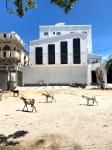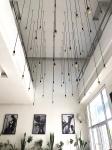War not only destroys nations, communities, and families, but it also destroys the entire social fabric of society, desensitizing people and depriving them of a sense of belonging to everything, including common spaces and infrastructure. It's even worse in Somalia, where long-standing tribal strife has divided entire cities and made it even more difficult for people to interact. Today Somalia is a different nation, a country that thrives economically and politically, but a country that is still recovering from the scars of its past. Salsabiil wants to recreate this sense of belonging helping to rebuild the social fabric of the city through a very contemporary yet traditional space. It is important to know that in Somalia the tradition of good conversations over a warm tea has been around for centuries and never ceased, even during the civil war. The restaurant was designed in a very neglected part of town that at the time did not have any modern shops or restaurants. Salsabiil has created a place within a neglected area to restore the right to beauty and peace that we all deserve. The layout and interior design of this place bring together people from all walks of life and backgrounds, from families to couples to seniors who have never experienced true peace in the last 30 years. Salsabiil acts like a public space that can be visited by anyone, a space where people can find their peaceful time once again. It wasn't the food, the location, or the execution that made this restaurant appreciated by the Somali community around the world, but the memories it was able to bring back to people, highlighting with its design the memories of a peaceful past but more importantly the hope for a brighter future. An architectural tribute to the local culture, community, and history of this proud and beautiful East African nation.
From the outside, Salsabiil's façade appears unpretentious and minimal, almost private and introverted. But like an old book with a dusty surface, the real surprise lies within. Mogadishu was once known as the "White Pearl of the Indian Ocean" for its white buildings, beautiful palm trees, and the blue of the Indian Ocean. The space reminds us of that, and as soon as you enter, you are greeted with white walls, ceiling, and floor, flanked by two rows of concrete that function as vases full of plants that remind us of the importance of preserving our flora that is now more than ever important, especially considering the severe deforestation and desertification that is effecting the whole nation. In contrast with the plain white walls emerge strongly the colorful use of fabrics that are covering the pillows and the sitting areas with traditional male and female fabric. In addition, there are two toilets in the restaurant (one for men and one for women) on the ground floor, which we wanted to make a special place considering their very central and visible location. In Somalia, like many other developing countries around the world, toilets are usually the less welcoming places and surely not a space to celebrate, but in this case, we tried to do the opposite. The two restrooms do not have official signage to indicate which is for men and which is for women leaving the user the freedom to decide. This was made possible by leveraging the culture and traditions of the country. The two main doors are upholstered in traditional Somali fabric, one for men and one for women which gives a clear understanding to the community about where to go. The design didn’t want to be an imposition on the community but rather a space where cultural identity and heritage become the protagonist of the whole space. Photographs depicting pre-civil war Mogadishu and scenes of everyday life are displayed throughout the rooms, taking guests on a journey of storytelling and nostalgia.
On the backside and upper floor, we find the spaces dedicated to the wedding and catering area that still follows the same design principle but on a bigger scale, in fact, the main staircase that guides you towards the main wedding hall welcomes the user with a big series of windows that works as a frame for a green external wall, a monolith once again, to the importance of preserving our green areas.
An Ode to Somali culture and heritage, this was the design purpose of Salsabiil.
2018
2019
Interior surface around 3500 mq
Omar Degan ( Principal and lead Architect) , Kassim Mohamed ( Architectural designer) , Muhiyadin Aweis Yusuf (Architectural designer)







